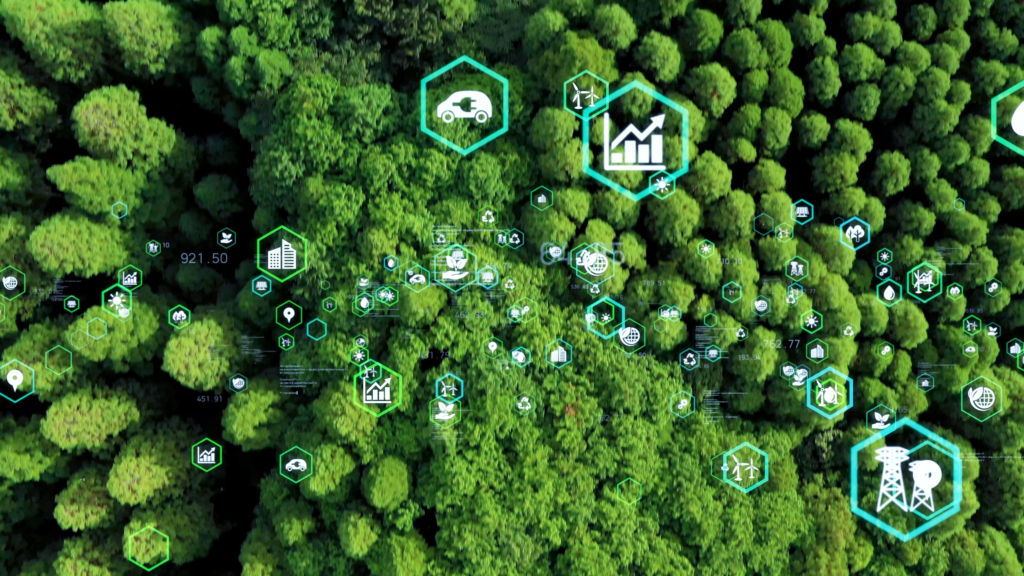Released on Friday, April 12, 2024
Özge Güney Altay, Resurgence Director at the Polsky Center, served as a judge for the regional EnergyTech UP competition hosted by the U.S. Department of Energy’s Office of Technology Transition in partnership with American Made Challenges.
>> Update: Team Rise Reforming from the University of Chicago won the event, taking home $50,000.
A team from the University of Chicago and the Polsky Center for Entrepreneurship and Innovation will be presenting at the upcoming national event, EnergyTech University Prize (EnergyTech UP).
Finalist teams will compete for more than $400,000 in prize money at the Energy Thought Summit in Austin, Texas on April 15.
Among them are three undergraduate students who met while studying molecular engineering at the University of Chicago and developed a shared interest in waste reprocessing after attending a lecture by Amghad Elgowaini, a researcher at Argonne National Laboratory.
George Rose, who worked as an undergraduate research associate in the Patel Group, co-founded Rise Reforming with classmates Lucas Zbilaga Mahag (BS ’25) and Jonah van Oord (BS ’26), former research assistants in the Gagliardi Group and interns at Argonne National Laboratory.
The idea for the startup began after receiving an email from the university promoting Kafel Yavuz’s research, specifically his novel “NiMoCat,” a catalyst for dry reforming. Though Rose wasn’t able to attend the talk, he contacted Yavuz about the technology and has since spent time “digging deeper” into the reforming process.
The initial goal was to use Yavuz’s breakthrough technology to transform landfill gas into valuable chemicals, but as Rose explained, “by the fall it was clear that transforming plastics made more sense, both technically and economically.”
Currently, the technology is focused on converting plastic waste into carbon-negative dimethyl ether (cnDME). “The process involves gasifying the plastic waste, dry reforming the resulting hydrocarbon gases into syngas, and then upgrading the syngas into our product, cnDME,” Rose said.
With renewable fuels as its primary target market, Rose said the product blended with liquefied petroleum gas (LPG) reduces life cycle emissions by 62% for a 20/80 DME/LPG blend compared to pure LPG. “Furthermore, the blend has an energy density comparable to diesel and gasoline, meaning cnDME can play a major role in decarbonizing the transportation industry,” he added.
After competing in the EnergyTech UP national finals, the team will now focus on patenting and demonstrating their process at lab-scale, which they hope will generate interest and funding to build a pilot module.
Among the finalists selected to present next week is Blaze Power, a graduate of the first batch of Polsky Center’s cleantech accelerator Resurgence. The startup is advancing the power of lithium manganese iron phosphate (LMFP) and iron-based cathodes to advance sustainability in next-generation battery materials.
“Of the 225 teams that competed in the regional competition, 28 will be competing in the national competition. This is no small achievement. We have reserved two seats for this great opportunity,” said Ozge Gunay Altay, Resurgence director at the Polski Center.
Gunay Altay was invited to represent the Great Lakes region as a judge for the EnergyTech UP regional competition, organized by Evergreen Climate Ventures, which has been Resurgence’s supporting ecosystem partner since before its launch last year.
“It was an amazing experience to hear the next generation of clean energy leaders talk about their passion projects,” said Gunay Altay.
EnergyTech UP is sponsored by the U.S. Department of Energy (DOE) Office of Technology Transition (OTT) in partnership with American-Made Challenges.
DOE’s American-Made program accelerates clean energy innovation through awards, training, mentoring and cross-sector collaboration. Part of the program, the Making Advanced Technology Commercialization Harmonized (Lab MATCH) awards, also recently announced their Phase 1 winners, including Leaf Automation, which is in Cohort 3 of Transform, the Polsky Center’s data science and AI accelerator.
Leaf Automation is developing next-generation AI-enhanced CAD plug-ins that accelerate and optimize the design of commercial electrical and mechanical systems. In applying for the award, a competition that matches national lab IP with startup commercialization, Leaf Automation listed IP from the National Renewable Energy Laboratory (NREL). The IP, which predicts the financial performance of specific PV solar systems, will be used to build the startup’s current PV design automation software, Branch, said CEO and founder Evan Haug.
// Resurgence is in partnership with the Pritzker School of Molecular Engineering, and Transform is in partnership with the Data Science Institute and is part of the Polsky Center’s new Deep Tech Ventures initiative. Deep Tech Ventures is a full-spectrum venture-backed initiative dedicated to translating deep tech innovations into startup companies that bring life-saving, world-changing products and services to market.

